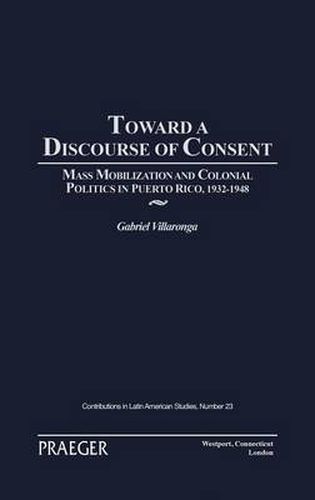Readings Newsletter
Become a Readings Member to make your shopping experience even easier.
Sign in or sign up for free!
You’re not far away from qualifying for FREE standard shipping within Australia
You’ve qualified for FREE standard shipping within Australia
The cart is loading…






A familiar feature of analyses about mass mobilization in Latin America between the 1930s and 1950s is an emphasis on manipulation and social control of leaders over their constituencies. This book addresses mass mobilization from a different angle by focusing less on the unidirectional action of leaders and the passivity of their followers and more on the interactive process between agents that informed their support for reform and the articulation of a political discourse based on notions of consent. Villaronga understands the consent of people and their discourse as both open support for socioeconomic improvement and as an agreement between multiple social and political groups about the need for change. To understand how consent produced a situation most beneficial for political leaders but effectively shaped by followers, this book focuses on the interaction between American authorities, the Popular Democratic Party (PPD), and its multiple supporters that informed colonial politics in Puerto Rico between 1932 and 1948.
Villaronga examines how the PPD in conjunction with U.S. officials created a coalition of disparate sectors such as urban workers, rural laborers, the unemployed, religious groups, women, Communists, independentists, technocrats, and dissidents from other political parties. The emergence of consent entailed a process through which many sectors of Puerto Rican society overcame their exclusion from political debate and constituted themselves as a viable political force. Moreover, consent not only informed a broad coalition of interests in favor of U.S. policies of reform, but also enabled PPD leaders to become the main representatives of the island’s mass movement.
$9.00 standard shipping within Australia
FREE standard shipping within Australia for orders over $100.00
Express & International shipping calculated at checkout
A familiar feature of analyses about mass mobilization in Latin America between the 1930s and 1950s is an emphasis on manipulation and social control of leaders over their constituencies. This book addresses mass mobilization from a different angle by focusing less on the unidirectional action of leaders and the passivity of their followers and more on the interactive process between agents that informed their support for reform and the articulation of a political discourse based on notions of consent. Villaronga understands the consent of people and their discourse as both open support for socioeconomic improvement and as an agreement between multiple social and political groups about the need for change. To understand how consent produced a situation most beneficial for political leaders but effectively shaped by followers, this book focuses on the interaction between American authorities, the Popular Democratic Party (PPD), and its multiple supporters that informed colonial politics in Puerto Rico between 1932 and 1948.
Villaronga examines how the PPD in conjunction with U.S. officials created a coalition of disparate sectors such as urban workers, rural laborers, the unemployed, religious groups, women, Communists, independentists, technocrats, and dissidents from other political parties. The emergence of consent entailed a process through which many sectors of Puerto Rican society overcame their exclusion from political debate and constituted themselves as a viable political force. Moreover, consent not only informed a broad coalition of interests in favor of U.S. policies of reform, but also enabled PPD leaders to become the main representatives of the island’s mass movement.